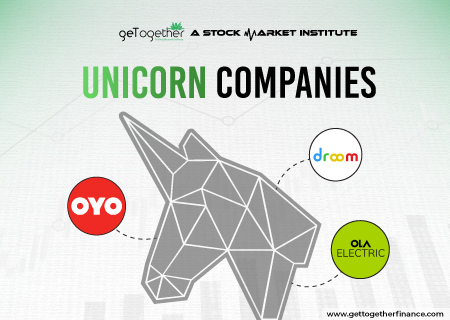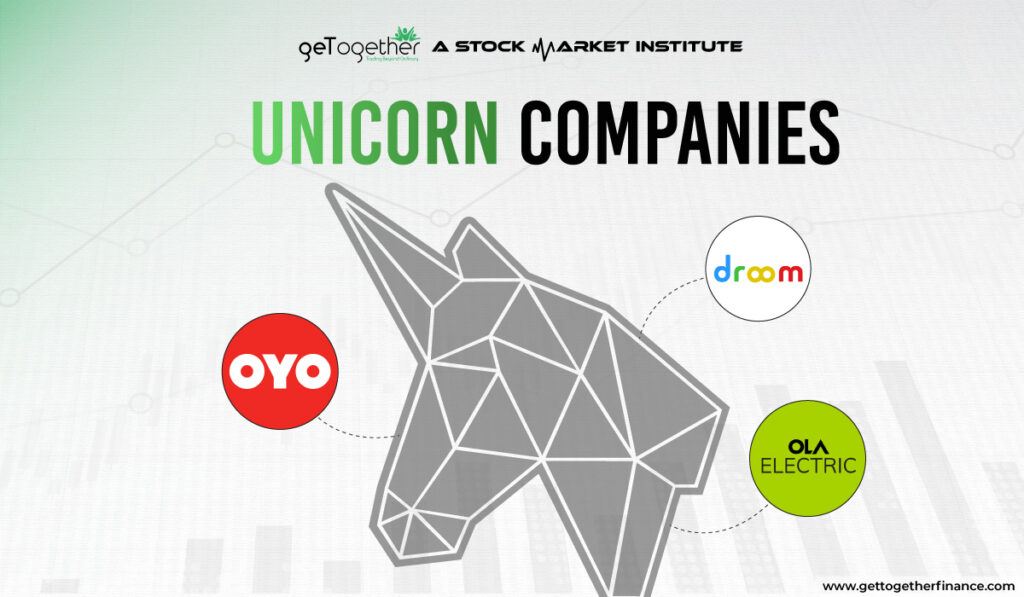Unicorn Companies: Transformation of Indian Startups
- November 15, 2024
- 761 Views
- by Manaswi Agarwal


Unicorn companies are the privately owned startups that are valued at $1 billion by venture capitalists and investors in its early years. These are the private enterprises which are not yet listed on the stock market for equity investing. Early investors have the advantage to gain more returns by investing in these firms. A company is more likely to attract funds from the investors if they can solve customers problems quickly. Let us deeply understand the actual essence of a unicorn company from this blog.
What is a Unicorn Venture or a Company?
A unicorn is a privately held startup company which has achieved a valuation exceeding $1 billion. These are some rare successful ventures that operate in various sectors like technology, e-commerce, finance, healthcare, etc. to be in the category of a unicorn startup, a company must be innovative, marketable and disruptive.
How Does a Company Become a Unicorn?

The primary reason for a company becoming a unicorn is its valuation. On the other hand, a company can do so by having an innovative and scalable business model that is able to offer something highly innovative or disruptive within its market. With an exceptional business model and high demand of the products justifies a billion dollar valuation of the company.
Valuation of Unicorns

Venture capitalists and the investors who participate in financing rounds develop a certain valuation of the business on the basis of which they get funding. All unicorns are basically startups that are driven by their growth potential and expected development. The valuation of businesses is determined by various factors and the development of long term forecasts.
Reasons of High Valuation of Unicorns

The valuation of a company or a startup is determined by the funding rounds led by the venture capitalists and investors. The venture capitalists identify various reasons for high valuation of a startup. These can be the reasons because of which a big investor can place a high valuation of the startup.
Fast Growth Strategy
Some companies are highly valued by venture capitalists as they primarily rely on fast growth strategies for the development of a startup. Fast growing strategies attract large amounts of money in every round of financing so that the company can capture the biggest possible market share while preventing the emergence of major rivals in the market.
Buyouts
There are many startups which are not able to meet the requirements of acquiring funding from an IPO. This makes the large companies to benefit from the deals by acquiring developed technologies and the competition gets intense because of several tech giants. The tech giants offer significant premiums to the startups boosting the valuation of target companies and hence creating unicorns.
Innovation and Technology
Bringing technology advancement in regular business operations allows faster growth of startups. With the advancement in new technologies, unicorn startups can reach their customers faster and conduct efficient production.
Unicorn Companies in India

In total India has more than 100 unicorn companies and has seen 3 new unicorn startups in the last year. In comparison to other countries, India holds third position of total unicorn companies after the United States followed by China. Some of the best examples of Unicorn in India are:
OYO
OYO, founded by Riteish Aggarwal is an online booking hotel accommodation platform where users can book their accommodations by selecting their preferred rooms with all the details. OYO was included in the unicorn club on Sep 25, 2018 after the company raised a $1 billion Series E funding round led by Soft bank vision fund where the startup was valued at $4.34 Billion.
Ola Electric
Ola electric was laid down by Bhavish Aggarwal which has become India’s first Artificial Intelligence unicorn in 2024 with an estimated valuation of $1 billion. The company joined the unicorn club in the year 2019 when it raised a fund of $267 million in series B funding round by Softbank which valued the company at $1 billion.
Droom
Droom is an AI-driven startup founded by Sandeep Aggarwal in 2014 that belongs to the consumer retail sector. Droom is a marketplace for consumers to buy or sell used multi category vehicles which include cars, motorcycles, electric vehicles and others. After raising a $200 million valuing the company at $1.2 billion, the company joined the unicorn club in 2021.
Urban Company
Abhiraj Singh Bahl founded Urban Company in the year 2014 which further joined the unicorn club in 2021 after raising a fund of $190 million Series F funding which was led by wellington, naspers and others valuing the company at $2.18 billion. Urban company is a service based startup where users are allowed to search and book multiple local services that include services such as beauty, wellness, home repair, yoga, cleaning, etc. through an application.
Acko
Acko is a company which provides multi category digital insurance and claim management solutions for individuals and businesses. The company had raised a funding of $255 million which led the company to join the unicorn club in 2021 and the round was led by intact ventures, general atlantic and others. The company enables users to purchase, administer and claim insurance for automobiles, health, employees, group medical, electronic devices and many more.
Challenges for Unicorn Companies

Unicorn companies are all about making big in valuation terms, however, it is never so easy like it seems because there are several challenges that have to be borne by these companies:
Sustain the Competition
The real challenge for a unicorn company or a startup is to sustain the fluctuating market conditions and survive the competitive atmosphere as there is no room for mistakes. To sustain in the competitive landscape of the marketplace, entrepreneurs of these startups must leverage their tactics as well as management. Otherwise, emerging companies would take no time to beat them.
Maintain Financial Assets
To get finances is crucial for unicorn companies but it’s not possible to raise enough money which creates a serious problem. Timely infusion of funds is required as and when the company grows and inability to infuse funds restricts the company to scale.
Management
Efficient management of the company ensures its scalability and a unicorn startup is dependent on trustworthy people with complementary skill sets. A failure of a team in any task can lead to the end of a startup. This is why appropriate management is required.
Future of Unicorn Companies

The future of a unicorn companies heavily relies on emerging trends in technology, shifting consumer behavior, and global economic changes. Many unicorn companies look forward to going public through IPOs or focus on mergers and acquisitions. This major shift of the companies could lead them to achieve better governance and performance standards. Moreover, to operate a sustainable business in future, unicorns are required to show their dedication towards environment, social, and governance factors.
Also Read: Switch to Green Energy
Conclusion
When the valuation of a privately owned company is determined as $1 billion or more by the investors or venture capitalists then it is known as a unicorn. Fast growing strategies and technological advancements attract investors who can derive the actual valuation of the enterprise.
FAQs
What is a Unicorn Startup?
Unicorn startups are privately owned businesses which are valued at $1 billion or more in its early years.
How many unicorn companies are there in India?
In India, there are 113 unicorn companies in total with a combined valuation of more than $350 billion. Some of the well known unicorn startups in India are OYO, Zomato, Droom, etc.
How to invest in unicorn companies?
To invest in these companies, an individual must own a high net worth with a good network and reputation as well. Investing in these companies requires a high amount of money, once a company is listed in an exchange then retail investors can also participate in the investment process.



 Instagram
Instagram 
